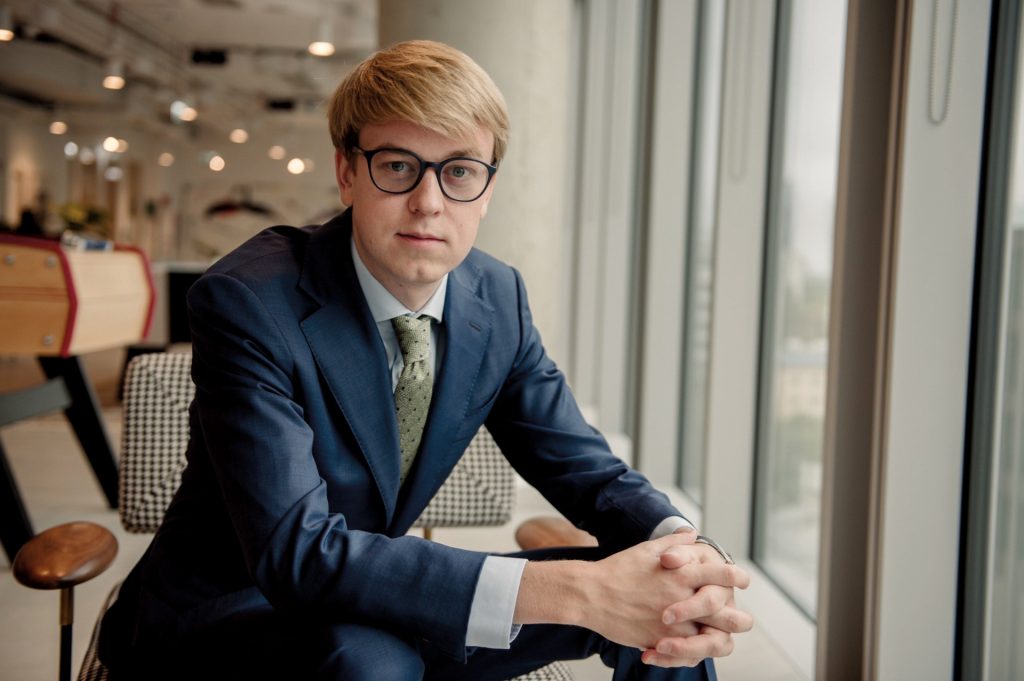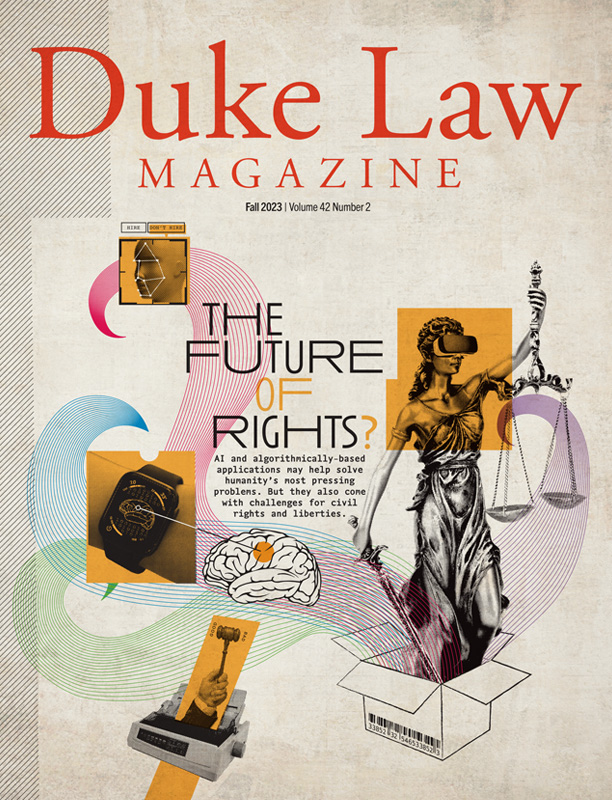
Alumni Q&A
Illia Salei LLM ’14
As a high school student, Illia Salei LLM ’14 was pretty confident he was going to be a lawyer. He never expected to be a political prisoner.
Salei, whose mother is a law professor and father established one of the first private law firms in post-Soviet Belarus, was detained in 2020 for his work representing politicians who opposed Belarusian autocrat Alexander Lukashenko in the country’s presidential election that year. Lukashenko, who has ruled since 1994, was declared the election’s victor despite allegations of widespread fraud that drew international condemnation and sparked the largest protests in Belarus’s history. His government responded with a brutal crackdown on dissent that has only intensified as the war in neighboring Ukraine has highlighted Lukashenko’s close ties to Russian President Vladimir Putin.
Salei and his law partner Maksim Znak were charged under an article of the Belarusian criminal code concerning “actions aimed at causing harm to national security of the Republic of Belarus,” and 84 international human rights organizations, bar associations, law societies, and individuals later signed a letter protesting their arrest. They spent a month in pre-trial detention before being summoned with other jailed activists to a remarkable meeting with Lukashenko broadcast on state television. After declining opportunities to recant his support for the opposition, Salei was transferred to house arrest for six months. Following his release, he escaped the country.
Since August 2022, Salei has served as associate counsel for the European Bank for Reconstruction and Development in London, which invests in countries transitioning to market-based systems and has pledged up to 3 billion euros in financing to support Ukraine’s economy during the war. He continues to speak out in support of his clients, who have been sentenced to lengthy prison terms, and against Lukashenko’s regime, including in meetings with officials in the United States and EU and a visit to Duke Law School.
Duke Law Magazine spoke with Salei about working for change in Belarus, his arrest and confinement, and his hopes for the future of his country.
Duke Law Magazine: When did your interest in political activism begin?
ILLIA SALEI: I was always interested in Belarusian history and politics, and after getting an education in the U.S. and having experience working in the jurisdictions where the law actually works, I wanted to contribute to developing this in my own country, which is very far from being a democratic state. In May 2020, a couple of pretty prominent people announced their presidential ambitions, and one of them was Viktar Babaryka, a famous Belarusian businessman and philanthropist and chairman of one of the largest private commercial banks in Belarus.
“…I was working a lot with the media, both Belarusian and international, trying to make the case as public as possible because this is actually one of the most powerful means of defense in Belarus. And apparently at some point I was too loud.”
In the very beginning, I was just collecting signatures, basically in the streets, in support of Viktar. But at some point when I was doing that, Viktar showed up himself to say hi to people, and I approached him and said, ‘It’s a great honor to meet you and I really admire your decision. This is indeed a very important step. And if you need any legal support for your campaign, I would be happy to help.’ And it was a very brave step of his — previously, almost every democratic presidential candidate in Belarus ended up in jail. As for me, in two days, I got a call from the campaign office saying, if you’re still interested, please come over.
DLM: At that time, did you have any sense that volunteering for his campaign would be risky?
IS: In theory, yes. We had the experience of previous presidential campaigns when candidates were arrested for allegedly trying to overthrow the government, just simply by participating in the election. But especially as a lawyer, you understand that every step you take is legal and absolutely lawful, so there should not be any reason for them to come after you. But when this happens, you understand what kind of reality you live in.
DLM: But you also believed that change was needed?
IS: There was a huge need. A whole new generation of educated people who studied abroad, like myself, were coming back home. The private sector in Belarus had already developed quite significantly, and people in the private sector appreciate freedom. And COVID-19 happened, and whole countries were going on lockdown, but in Belarus, Lukashenko was saying that this is a conspiracy, and COVID doesn’t exist. As a preventive measure against COVID, he suggested Belarusian people continue working, drink vodka, and go to the sauna. So people did not need to be MDs to understand that the government simply lies to their faces.
DLM: When Lukashenko was declared the winner, you were representing the only opposition leader who was still free and had remained in the country, Maria Kalesnikava, whom the government also later arrested. Was that what led to your arrest?
IS: Indeed, I was honored to represent and advise Maria, a true leader and one of the bravest people I have ever met in my life. Following her arrest, I was working a lot with the media, both Belarusian and international, trying to make the case as public as possible because this is actually one of the most powerful means of defense in Belarus. And apparently at some point I was too loud. I was leaving my apartment in the morning and when I opened the door, seven or eight masked unidentified guys entered my apartment and handcuffed me. I was then brought to the state investigative committee for interrogation and further transferred to the pretrial detention center, in the very city center of Minsk. I spent a month-and-a-half there.
DLM: And Lukashenko actually visited you?
IS: Yes. One early morning, a month after my arrest, they brought me to the headquarters of the security service — the KGB — in the center of Minsk to a room with others who were involved in the democratic movement, including Viktar. Lukashenko entered the room and asked, ‘So what did you want?’ But obviously he was not interested in our answers. It was more like a lecture on how he was ‘building’ the country. When Viktar told him that we actually just want to live in a free society, we want a free market economy, we want a fair election, we want independent courts and the rule of law, the answer from Lukashenko was that he had seen the market economy and democracy in the 1990s after the Soviet Union collapsed and it doesn’t work. In Lukashenko’s opinion, Belarusian people don’t like it. He did not believe that hundreds of thousands of Belarusians were protesting in the streets exactly in support of democratic values. Or he did not want to believe.
“Lukashenko entered the room and asked, ‘So what did you want?’ But obviously he was not interested in our answers. It was more like a lecture on how he was ‘building’ the country.”

DLM: What happened after that meeting?
IS: A couple of days after the meeting with Lukashenko, I was transferred to house arrest. In my view, they wanted to pacify the protests by showing that Lukashenko is ready to make certain steps towards the people demanding change. In return, they were awaiting certain steps from us. A couple of times I was offered the chance to cooperate and to give interviews to state media. But I refused. I said, ‘No, I have my values and I know that I didn’t do anything wrong because I’m a lawyer myself.’ So I spent another six months under house arrest in complete isolation. No internet, no visitors, no outside walks — even in jail you are brought for a 30-minute walk once a day. On the one hand, it’s way better to be at home, but mentally I think it was even more difficult than in jail.
After six months I was released on bail. I was allowed to continue working but strictly advised not to take part in any political activity, not to give any interviews to independent media. Otherwise, I would go back to jail. I saw that the people who were released before I was, the security service started arresting them again. Viktar had been sentenced to 14 years in prison. I realized that I needed to flee the country. I didn’t tell my family, I didn’t tell my friends, because I realized that if someone came to them asking where I am, they would not need to lie, because they will sincerely not know where I am. I just took my backpack and left Minsk at night. And in a couple of weeks, I found myself in Poland where I lived until August 2022. And then I moved to London.
DLM: It must be difficult to be away from your country, especially as it seems like the situation there has only deteriorated.
IS: Obviously, I cannot go back because I’m still being prosecuted, but I do miss my home. I miss my friends. The Belarusian regime is only increasing the repressions. Every day someone is being arrested, especially those people who stood up against war in Ukraine, those people who were helping Ukraine.
DLM: It’s telling that so many of the people facing repression are lawyers.
IS: In authoritarian regimes, the key threats are lawyers and journalists. Maksim and I were the first cases of serious repression against lawyers. After that, for quite a long time, no lawyers were arrested. The targeted repressions against lawyers mostly involved disbarment on fake grounds of violation of professional ethics or lack of qualification. But then at some point they realized that this is not enough and initiated changes to the law regulating the legal profession. Before, advocates were allowed to have their own private practices as a law firm or as an individual lawyer. Today, they are allowed to practice only in specially created legal entities being established by the Ministry of Justice and under its full control. So there is no more independent bar in Belarus.
DLM: What are your hopes or expectations for Belarus moving forward?
IS: I’m pretty confident that in the end, Belarus will be an independent and democratic country with the rule of law and an independent court system and a proud member of the European family of democratic states. For one simple reason: We have no other option. Belarus is a European nation with rich history and traditions of democracy and the rule of law. Our ancestors were among those who back in the 16th century drafted the Statutes of the Grand Duchy of Lithuania, the first codified laws in Europe, as well as the Constitution of 3 May 1791, the first modern constitution in Europe. Our feeling of freedom was taken from us at the time of the Russian occupation at the end of 18th century, and we still go through the phantom pains of the former Soviet empire. But we had our feeling of freedom back in 2020. And once you felt it, you know, it’s impossible to take it from you.

